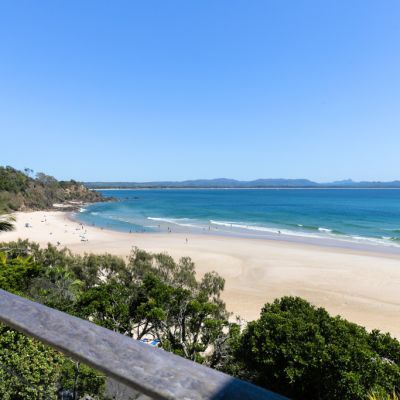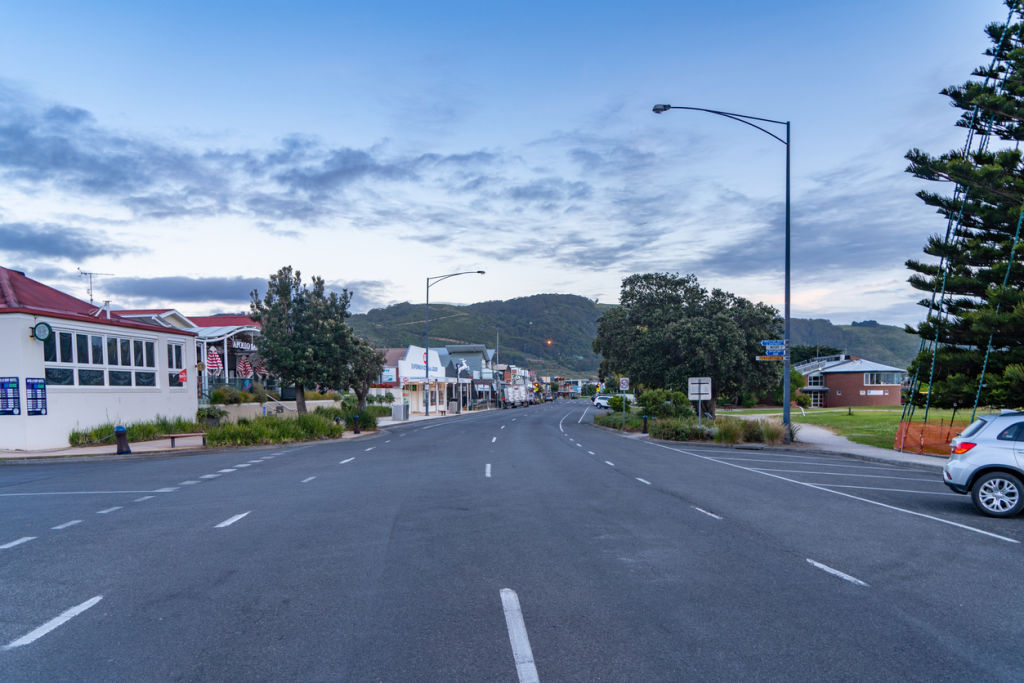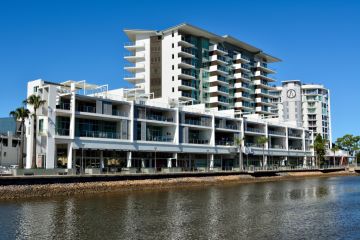Cashed-up sea-changers and holiday rentals: Why coastal town residents are at risk of being priced out

For essential workers, housing affordability is at risk amid an influx of cashed-up professionals relocating from the city to coastal towns, experts warn.
Already-strained housing markets – where some stock is set aside as short-term rentals – are likely to heat up further, reducing choice for workers on lower incomes, despite the benefits new residents bring to the local economy.
The sea-change trend has picked up pace over the past year as the COVID-19 pandemic prompted a widespread shift to remote working, with house prices in some regional areas up almost a third and sea-change favourite Byron Bay rising 29.2 per cent. But improvements in technology in recent years mean the trend is not new.
Lower-income workers with jobs in some coastal areas have already been forced to look further out of town for a place to live, said Australian Coastal Councils Association executive director Alan Stokes, a situation that could get worse.
“The availability of accommodation for essential workers is a concern and has been a concern for a number of years,” Mr Stokes said.
“What tends to happen is that people tend to commute more and greater distances.
“Looking at the Surf Coast and thinking of an area like Lorne, for example, it’s very busy at this time of the year. A lot of those workers are coming in from larger population areas like Geelong, Ballarat and Colac.”
University of Sydney urban planner Professor Nicole Gurran noted the imbalance between the wealth of new residents and existing community members.
 Regional NSW rents soar as city dwellers seek a tree change: Domain Rent Report
Regional NSW rents soar as city dwellers seek a tree change: Domain Rent Report Tree and sea changers push regional Victoria rents up by double figures: Domain Rent Report
Tree and sea changers push regional Victoria rents up by double figures: Domain Rent Report Rents in regional Australia soar as remote workers move out of cities: Domain Rent Report
Rents in regional Australia soar as remote workers move out of cities: Domain Rent Report Rental vacancy rates drop in coastal towns due to sea-change trend
Rental vacancy rates drop in coastal towns due to sea-change trend
“You have people with high incomes and higher wealth resulting from owning and selling property in capital city markets moving in … that puts inflationary pressure [on prices],” she said.
While it would not be immediately clear whether this pressure would be enough to price out essential workers – ranging from government workers to retail assistants – she said it was likely some workers would be forced to change their living arrangements as a result.
“It would be premature to say a teacher or nurse [already renting there] is being priced out of the market,” Professor Gurran said. “The issue [may be] a teacher or a nurse trying to relocate to those areas.”
Those on lower incomes may have to look for housing further from their work.
“They commute, and that’s really problematic. They could be living half an hour away in areas where there’s no public transport,” she said.

Professor Gurran said housing affordability had long been an issue in coastal areas due to the lower median incomes and competition between the permanent and holiday letting market, with these pressures “put on steroids” in the past decade by the proliferation of short-term rental platforms like Airbnb.
“The Airbnb platform was probably slower to reach out from the coastal areas [from Sydney and Melbourne], but when it did in a number of communities, but not all communities, it certainly had an impact on the housing market in terms of competition between residents and tourists and [therefore] on house prices,” she said, of research she published in 2018 commissioned by the Coastal Councils Association.
“That’s particularly evident in places like the Mornington Peninsula and Byron Bay.”
The platform had led to increased investment in coastal housing by city-based investors wanting an “investment with benefits” – a holiday house that also offered short-term rental income, she said.
This had led to existing housing stock being soaked up by the short-term rental market, placing pressure on both rental and purchase prices, with little evidence of regional Airbnb listings having reduced during the pandemic.
“There’s an irony where there is abundant housing stock [in these communities], but it is being used as short-term rentals,” she said.
Urban economist and director of Ethos Urban Chris McNeill said even if a relatively small number of Melbourne or Sydney residents made a sea change it could have an impact on prices.
“If you’re talking about smaller coastal towns, even small changes which occur in the Melbourne can have a profound [effect] on those places. It doesn’t take a major change in a city of 5 million for the spin-off effects to be more profound in smaller towns,” Mr McNeill said.
Whether this growth would be sustainable was not yet clear, though Mr McNeill predicted that the structural changes to work patterns meant it was likely it would be.
Mr McNeill said that towns within a two to two-and-a-half-hour drive of Melbourne would be most likely to experience decreased affordability in the coming year or two.
“If there are increased demand and a fixed supply of housing, it probably means prices will go up, and there will be a decrease in affordability,” he said.
Despite the price pressure, sea-changers also have positive effects such as job creation and increased economic activity in coastal towns.
“If the population in those towns does go up then clearly it’s good for those towns in terms of their retail sector and other commercial services,” Mr McNeill said.
Mr Stokes of the Coastal Councils Association agreed.
“There will be a larger, permanent, year-round population in coastal areas [and] those people are going to be welcomed with open arms,” he said. “With their income, they will stimulate local economies; they are doing all of their shopping locally.”

To mitigate affordability problems, policymakers will need to consider regulatory changes tailored to individual communities, such as introducing a cap on the number of nights a short-term listing can be let or restricting letting to permanent residences, Professor Gurran said.
Investment in developing affordable housing stock would also be an easy way for governments to ensure coastal communities remain accessible to essential workers.
“There’s a need for social and affordable housing, and that’s a great way to provide economic opportunities to regional areas as well,” she said.
Short-term rental site Stayz said many communities have “benefited from valuable tourism dollars” resulting from short-term accommodation which has “supported economic activity and jobs for locals”.
But Eacham Curry, Stayz Corporate Affairs Director said that there is an “opportunity for regulatory change” to better evaluate the impact of short-term letting on coastal communities.
“Stayz advocates for state-based regulation that contains a simple registration scheme for all short-term rental listings, a code of conduct that is backed by a strikes-based disciplinary regime, and an industry body to adjudicate compliance with the code of conduct,” Mr Curry said.
Airbnb’s Head of Public Policy in Australia, Derek Nolan, said: “Housing affordability is an extremely complex issue with a range of contributing factors, such as long-term population shifts, supply growth and broader economic conditions. Short-term rentals generally comprise only a small percentage of the overall housing market.”
“Many hosts on Airbnb share their own home to help combat the rising costs of living and meet mortgage repayments. In turn, these hosts help drive economic growth, and job creation and many local businesses rely on the valuable tourism dollars spent by Airbnb guests,” Mr Nolan said.
We thought you might like
States
Capital Cities
Capital Cities - Rentals
Popular Areas
Allhomes
More







